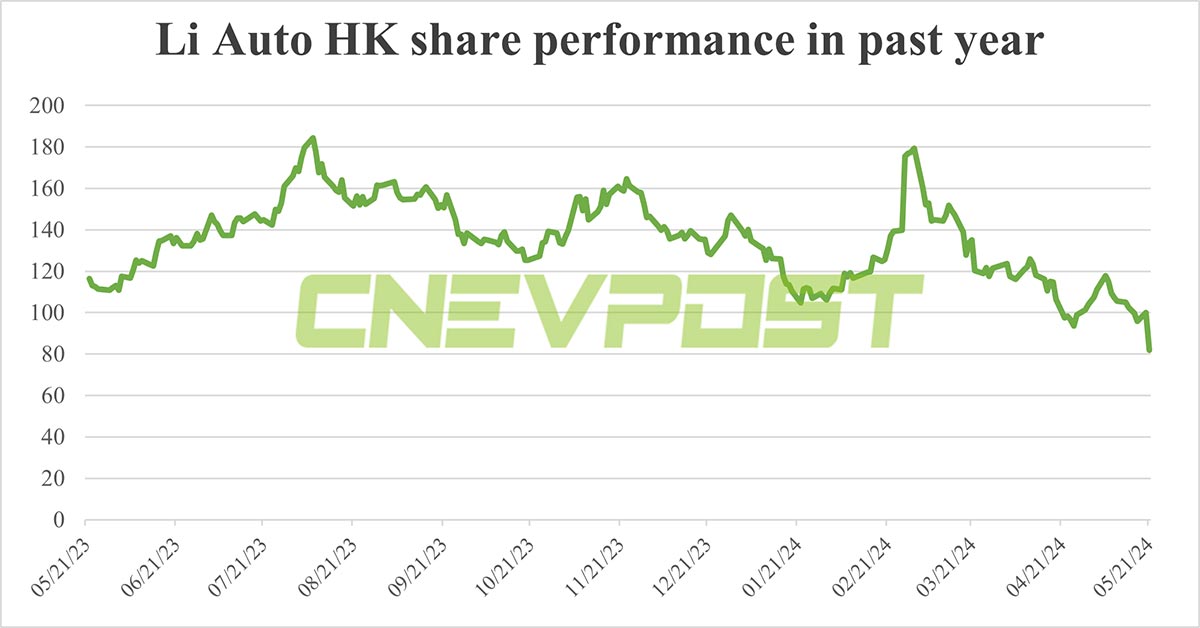Li Auto's BEV endeavors appear to be facing structural challenges as transferring its EREV success to BEV is not so straightforward, Deutsche Bank said.
Li Auto (NASDAQ: LI) shares traded in Hong Kong tumbled in early trading on Tuesday, following the overnight performance in the US stock market on the back of its disappointing earnings report.
At press time, the Chinese carmaker was down about 18 percent to HK$82 in Hong Kong, bringing its year-to-date loss to 44 percent. The company closed down 12.78 percent overnight to $21.71 in the US stock market.
Li Auto reported financial results yesterday before the US stock market opened that showed it posted a net income of RMB 591.1 million ($81.6 million) in the first quarter, down 36.7 percent from a year earlier and down 89.7 percent from the fourth quarter.
The company guided to deliver between 105,000 and 110,000 vehicles in the second quarter, lower than Wall Street expectations of 130,692.
The company pushed back its plan to launch more all-electric models to the first half of next year, a delay from the second half of this year that it had previously planned, underscoring the challenges it faces as it enters the battery electric vehicle (BEV) market.
Li Auto won't release any all-electric SUVs this year, and they will be released in the first half of next year, its management said in an earnings call yesterday.
The company said in its last earnings call that it would release three all-electric SUV models in the second half of 2024.
A sufficient number of self-operated superchargers is necessary to sell pure-electric SUVs at this stage, Li Auto's management said.
The right time for Li Auto to bring its all-electric products to market will be when it reaches a similar number of self-operated superchargers as Tesla China, the company said.
In the meantime, Li Auto needs to upgrade and add stores with more displaying spaces, its management said.
Li Auto is one of the major extended-range electric vehicle (EREV) players in China, selling mainly L-series EREVs, including the Li L6, Li L7, Li L8 and Li L9.
On March 1 this year, Li Auto's first BEV model, the Li Mega MPV (multi-purpose vehicle), was launched at a starting price of RMB 559,800 yuan. On the same day, the 2024 models of its L-series EREVs, Li L7, Li L8 and Li L9, were also launched.
Li Auto management was initially very optimistic about the Li Mega, saying the model would challenge monthly sales of 8,000 units. However, the initial acceptance of the model has been much less than expected, forcing it to lower its expectations for full-year deliveries this year.
After a complete reversal in sentiment and stock price, Li Auto finds itself up against the ropes for the first time in a long time, facing uncertainty over volume, declining margins and concerns about its BEV roadmap, Deutsche Bank analyst Edison Yu's team said in a research note overnight.
"At the core, we believe this is indicative of two broader developments: EREV becoming much more competitive mostly due to Huawei/Aito and premium BEV simply being a difficult market to crack (just ask Nio)," the team wrote.
Li Auto's BEV endeavors appear to be facing structural challenges as transferring its EREV success to BEV is not so straightforward, Yu's team said.
"Ultimately, we suspect LI will have to consider lowering its price range on BEVs to garner larger volumes," the team wrote.
The team expects Li Auto to deliver 505,000 units in all of 2024, below the company's guidance of 560,000 units at the low end of the range.
Other EV stocks traded in Hong Kong were also sluggish in early trading today, with Nio down 4.7 percent at press time, Xpeng (NYSE: XPEV) down 6.86 percent, and BYD down 3.44 percent.
($1 = RMB 7.2414)

